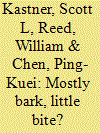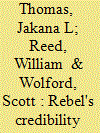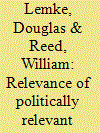| Srl | Item |
| 1 |
ID:
134458


|
|
|
|
|
| Summary/Abstract |
This article attempts to answer the question of why major powers engage in more active foreign policy behaviors than minor powers. It does so by comparing two explanations for the increased conflict propensity of major powers. The first explanation focuses on major powers’ observable capabilities, while the second stresses their different behavior. We incorporate both into an ultimatum model of conflict in which a state’s cost of conflict consists of both observable and behavioral components. Using data from the period from 1870 to 2001, we empirically illustrate the observable and behavioral differences between major and minor powers. We then utilize a decomposition model to assess the relative significance of the two explanations. The results suggest that most of the difference in conflict propensity between major and minor powers can be attributed to observable differences.
|
|
|
|
|
|
|
|
|
|
|
|
|
|
|
|
| 2 |
ID:
124076


|
|
|
| 3 |
ID:
147548


|
|
|
|
|
| Summary/Abstract |
This article examines why rebel groups make large demands of governments that are inconsistent with their fighting capacity, especially when such demands are almost always rejected. We show that making large demands, even if ultimately rejected by the government, makes sense for rebels who face a credibility dilemma. Such a dilemma is most likely to arise when militarily weak rebel groups face governments of uncertain strength and can commit to fight credibly only when they believe the government is also weak. This results in a counterintuitive set of strategic incentives for weak rebels, who choose their demands to ensure that they are rejected even when the government is weak. Thus, to make their threat to fight credible, weak rebels make large demands that, when rejected, result in inefficient fighting. Since most civil wars are characterized by weak rebels bargaining with much stronger governments, it is important to understand how this particular feature of civil war shapes intrawar negotiations between the rebels and the government. We develop a model of bargaining between a government and rebel group and evaluate its implications using historical data on civil conflict in Africa from 1989 to 2010. The results suggest that the tendency for the government to be significantly stronger than rebels induces rebel groups to make unrealistically large demands.
|
|
|
|
|
|
|
|
|
|
|
|
|
|
|
|
| 4 |
ID:
065793


|
|
|